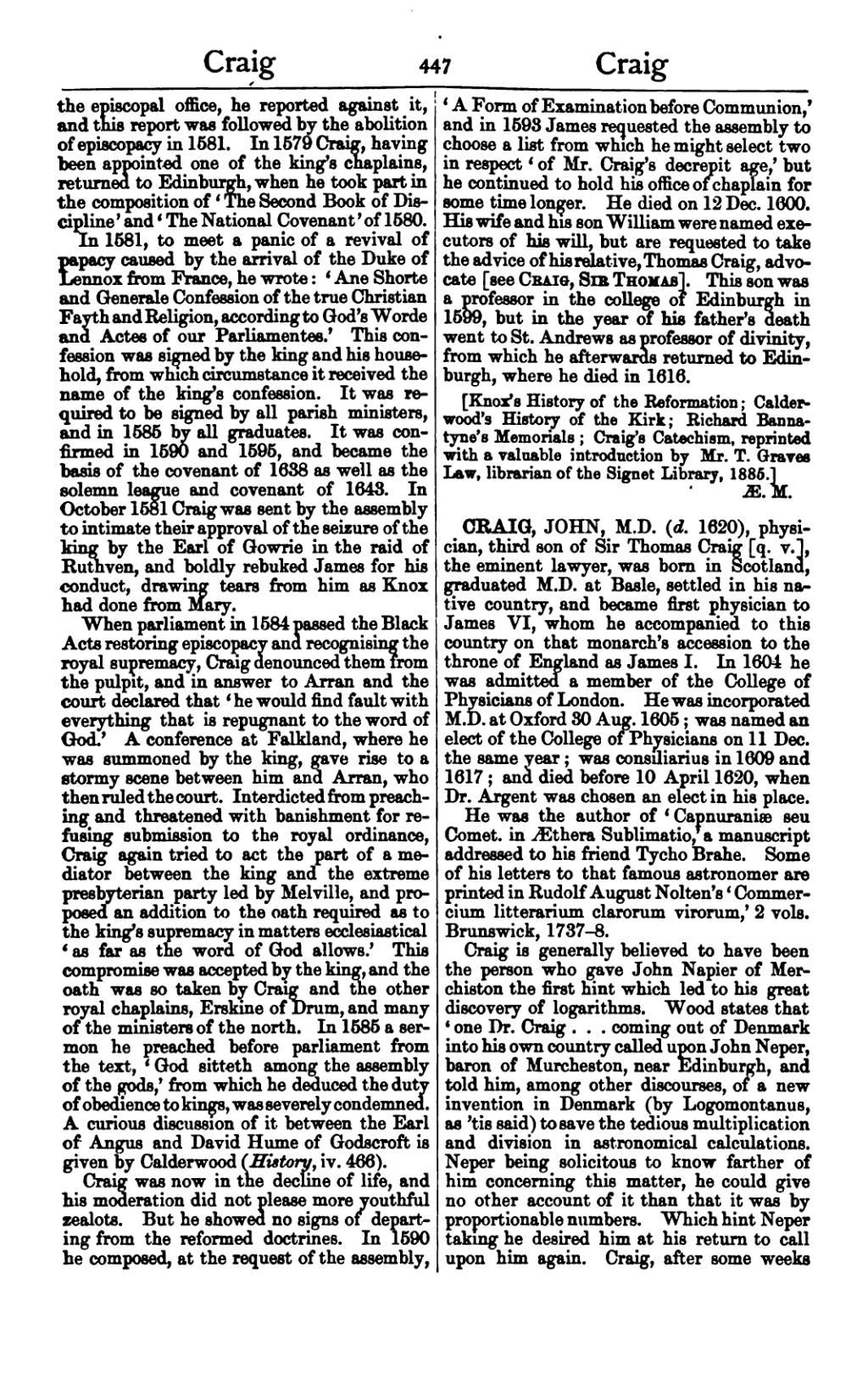the episcopal office, he reported against it, and this report was followed by the abolition of episcopacy in 1581. In 1579 Craig, having been appointed one of the king's chaplains, returned to Edinburgh, when he took part in the composition of ‘The Second Book of Discipline’ and ‘The National Covenant’ of 1580.
In 1581, to meet a panic of a revival of papacy caused by the arrival of the Duke of Lennox from France, he wrote: ‘Ane Shorte and Generale Confession of the true Christian Fayth and Religion, according to God's Worde and Actes of our Parliamentes.’ This confession was signed by the king and his household, from which circumstance it received the name of the king's confession. It was required to be signed by all parish ministers, and in 1585 by all graduates. It was confirmed in 1590 and 1595, and became the basis of the covenant of 1638 as well as the solemn league and covenant of 1643. In October 1581 Craig was sent by the assembly to intimate their approval of the seizure of the king by the Earl of Gowrie in the raid of Ruthven, and boldly rebuked James for his conduct, drawing tears from him as Knox had done from Mary.
When parliament in 1584 passed the Black Acts restoring episcopacy and recognising the royal supremacy, Craig denounced them from the pulpit, and in answer to Arran and the court declared that ‘he would find fault with everything that is repugnant to the word of God.’ A conference at Falkland, where he was summoned by the king, gave rise to a stormy scene between him and Arran, who then ruled the court. Interdicted from preaching and threatened with banishment for refusing submission to the royal ordinance, Craig again tried to act the part of a mediator between the king and the extreme presbyterian party led by Melville, and proposed an addition to the oath required as to the king's supremacy in matters ecclesiastical ‘as far as the word of God allows.’ This compromise was accepted by the king, and the oath was so taken by Craig and the other royal chaplains, Erskine of Drum, and many of the ministers of the north. In 1585 a sermon he preached before parliament from the text, ‘God sitteth among the assembly of the gods,’ from which he deduced the duty of obedience to kings, was severely condemned. A curious discussion of it between the Earl of Angus and David Hume of Godscroft is given by Calderwood (History, iv. 466).
Craig was now in the decline of life, and his moderation did not please more youthful zealots. But he showed no signs of departing from the reformed doctrines. In 1590 he composed, at the request of the assembly, ‘A Form of Examination before Communion,’ and in 1593 James requested the assembly to choose a list from which he might select two in respect ‘of Mr. Craig's decrepit age,’ but he continued to hold his office of chaplain for some time longer. He died on 12 Dec. 1600. His wife and his son William were named executors of his will, but are requested to take the advice of his relative, Thomas Craig, advocate [see Craig, Sir Thomas]. This son was a professor in the college of Edinburgh in 1599, but in the year of his father's death went to St. Andrews as professor of divinity, from which he afterwards returned to Edinburgh, where he died in 1616.
[Knox's History of the Reformation; Calderwood's History of the Kirk; Richard Bannatyne's Memorials; Craig's Catechism, reprinted with a valuable introduction by Mr. T. Graves Law, librarian of the Signet Library, 1885.]
CRAIG, JOHN, M.D. (d. 1620), physician, third son of Sir Thomas Craig [q. v.], the eminent lawyer, was born in Scotland, graduated M.D. at Basle, settled in his native country, and became first physician to James VI, whom he accompanied to this country on that monarch's accession to the throne of England as James I. In 1604 he was admitted a member of the College of Physicians of London. He was incorporated M.D. at Oxford 30 Aug. 1605; was named an elect of the College of Physicians on 11 Dec. the same year; was consiliarius in 1609 and 1617; and died before 10 April 1620, when Dr. Argent was chosen an elect in his place.
He was the author of 'Capnuraniae seu Comet, in Aethera Sublimatio,' a manuscript addressed to his friend Tycho Brahe. Some of his letters to that famous astronomer are printed in Rudolf August Nolten's 'Commercium litterarium clarorum virorum,' 2 vols. Brunswick, 1737-8.
Craig is generally believed to have been the person who gave John Napier of Merchiston the first hint which led to his great discovery of logarithms. Wood states that 'one Dr. Craig . . . coming out of Denmark into his own country called upon John Neper, baron of Murcheston, near Edinburgh, and told him, among other discourses, of a new invention in Denmark (by Logomontanus, as 'tis said) to save the tedious multiplication and division in astronomical calculations. Neper being solicitous to know farther of him concerning this matter, he could give no other account of it than that it was by proportionable numbers. Which hint Neper taking he desired him at his return to call upon him again. Craig, after some weeks
